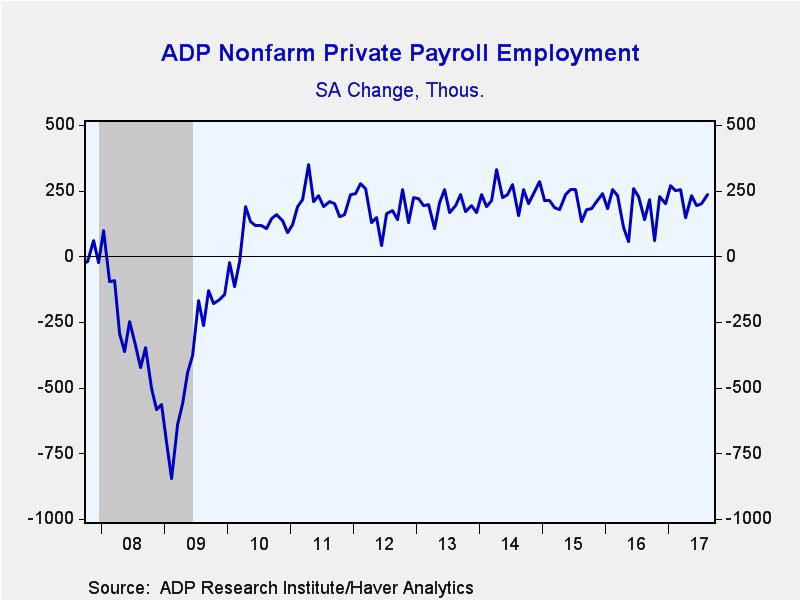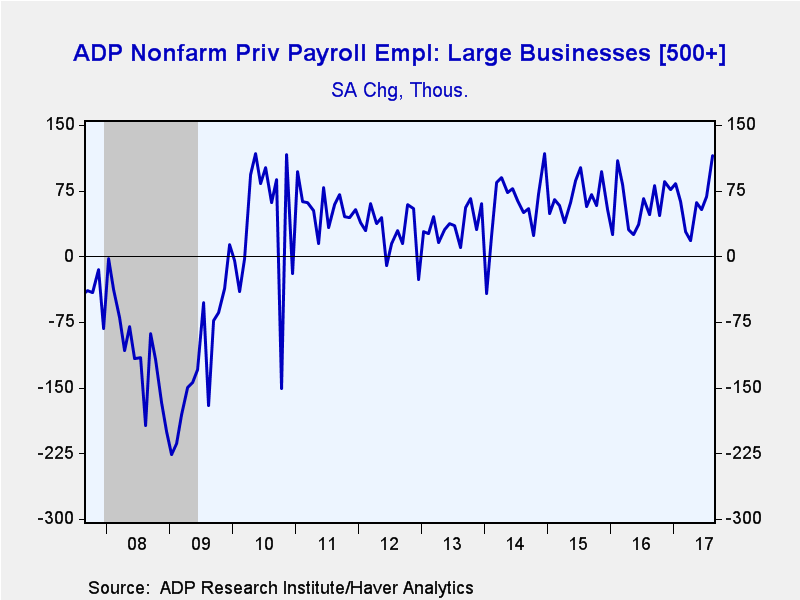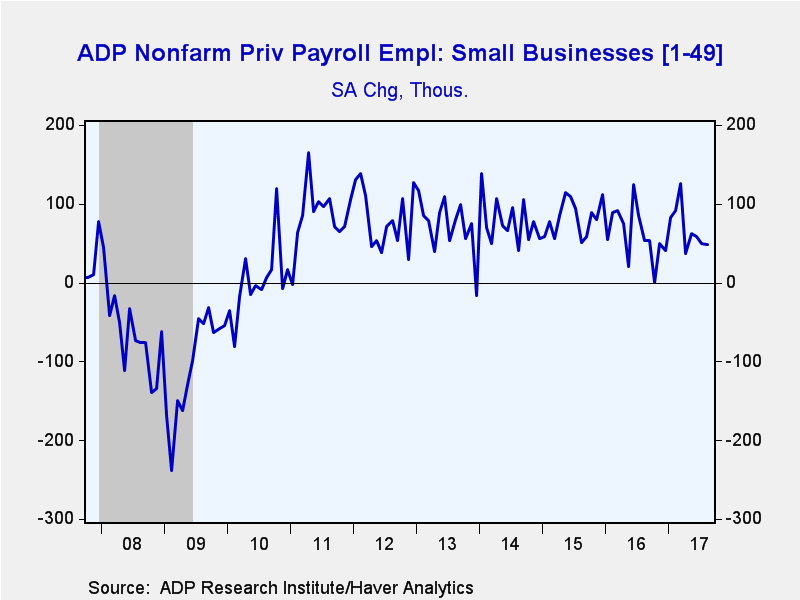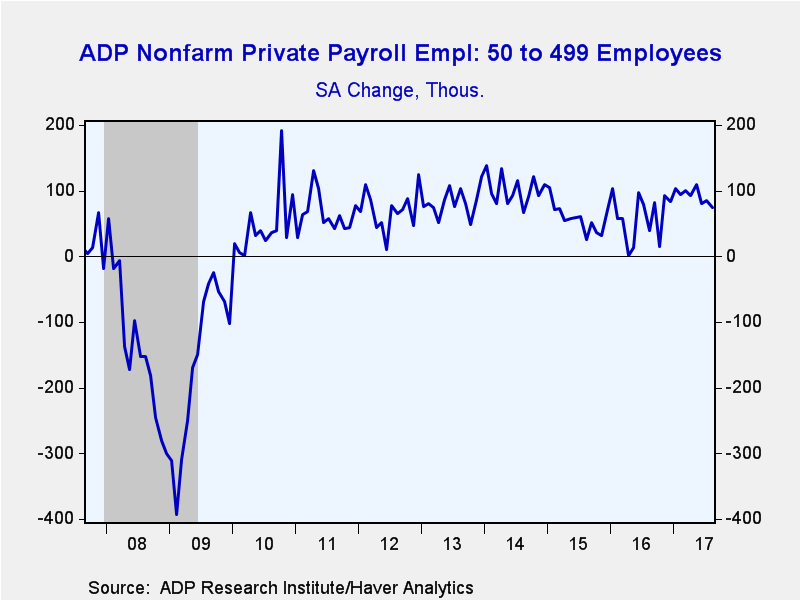 Global| Aug 30 2017
Global| Aug 30 2017U.S. ADP Private Payroll Growth Picks Up in Large Sized Firms
by:Tom Moeller
|in:Economy in Brief
Summary
The ADP/Moody's National Employment Report indicated that private nonfarm payrolls increased 237,000 (2.0% y/y) during August following a 201,000 July rise, revised from 178,000. June's 192,000 increase was little revised. Monthly [...]
The ADP/Moody's National Employment Report indicated that private nonfarm payrolls increased 237,000 (2.0% y/y) during August following a 201,000 July rise, revised from 178,000. June's 192,000 increase was little revised. Monthly gains in employment this year have averaged 179,000 per month after averaging 174,000 last year. A 180,000 rise had been expected in the Action Economics Forecast Survey. During the last ten years, there has been a 96% correlation between the change in the ADP figure and the change in nonfarm private sector payrolls as measured by the Bureau of Labor Statistics.
The Automatic Data Processing Research Institute survey is based on ADP's business payroll transaction system covering 411,000 companies and nearly 24 million employees. The data are processed by Moody's Analytics Inc., then calibrated and aligned with the BLS establishment survey data. The ADP data cover private sector employment only.
Large-sized payrolls improved 115,000 (2.8% y/y), up from July's 68,000 gain and from the 51,000 first half average. Small-sized business payrolls increased 48,000 (1.4% y/y) following a 49,000 rise. Both increases were depressed relative to the 76,000 average earlier in the year. Medium-sized payrolls increased 74,000 (2.3% y/y) after an 85,000 rise. That compared to the 97,000 average during the first six months of 2017.
Employment in the goods-producing sector rose 33,000 (2.0% y/y) following a 11,000 increase. These gains were below the year's first half average of 51,000. Construction sector payrolls improved 18,000 (3.6% y/y) after an 11,000 rise, both down from a 28,000 average in this year's first six months. Jobs in the factory sector gained 16,000 (1.1% y/y) following a 1,000 dip, both below the first half average gain of 18,000.
Private service sector payrolls strengthened 204,000 (2.0% y/y) and surpassed the 176,000 average rise earlier in the year. The number of trade, transportation and utilities jobs jumped 56,000 (1.1% y/y), up from last year's 33,000 average. The number of leisure & hospitality jobs rose 50,000 (2.4% y/y), also higher than the 34,000 averaged earlier in the year. Elsewhere in the service sector, employment growth weakened. Professional & business services payrolls rose a diminished 39,000 (3.5% y/y), down from 62,000 in this year's first seven months. Education & health services employment rose a fairly steady 45,000 (2.2% y/y), though the recent increases are sharply below the peak gains during 2015. Financial activities jobs rose a somewhat softer 12,000 (1.8% y/y). Employment in the information sector declined 3,000 (-0.6% y/y) where payrolls have been falling since early last year.
The ADP National Employment Report data are maintained in Haver's USECON database; historical figures date back to April 2001 for the total and industry breakdown, and back to January 2005 for the business size breakout. The expectation figure is available in Haver's AS1REPNA database.
| ADP/Moody's National Employment Rep | Aug | Jul | Jun | Aug Y/Y | 2016 | 2015 | 2014 |
|---|---|---|---|---|---|---|---|
| Nonfarm Private Payroll Employment (m/m chg, 000s) | 237 | 201 | 192 | 2.0% | 1.9% | 2.3% | 2.2% |
| Small Payroll (1-49) | 48 | 49 | 59 | 1.4 | 1.9 | 1.9 | 1.8 |
| Medium Payroll (50-499) | 74 | 85 | 80 | 2.3 | 1.5 | 2.3 | 2.8 |
| Large Payroll (>500) | 115 | 68 | 53 | 2.8 | 2.8 | 3.0 | 2.1 |
| Goods-Producing | 33 | 11 | 17 | 2.0 | 0.8 | 2.0 | 2.6 |
| Construction | 18 | 11 | 8 | 3.6 | 4.1 | 5.2 | 4.9 |
| Manufacturing | 16 | -1 | 9 | 1.1 | 0.2 | 1.2 | 1.4 |
| Service-Producing | 204 | 190 | 175 | 2.0 | 2.2 | 2.3 | 2.2 |
Tom Moeller
AuthorMore in Author Profile »Prior to joining Haver Analytics in 2000, Mr. Moeller worked as the Economist at Chancellor Capital Management from 1985 to 1999. There, he developed comprehensive economic forecasts and interpreted economic data for equity and fixed income portfolio managers. Also at Chancellor, Mr. Moeller worked as an equity analyst and was responsible for researching and rating companies in the economically sensitive automobile and housing industries for investment in Chancellor’s equity portfolio. Prior to joining Chancellor, Mr. Moeller was an Economist at Citibank from 1979 to 1984. He also analyzed pricing behavior in the metals industry for the Council on Wage and Price Stability in Washington, D.C. In 1999, Mr. Moeller received the award for most accurate forecast from the Forecasters' Club of New York. From 1990 to 1992 he was President of the New York Association for Business Economists. Mr. Moeller earned an M.B.A. in Finance from Fordham University, where he graduated in 1987. He holds a Bachelor of Arts in Economics from George Washington University.










